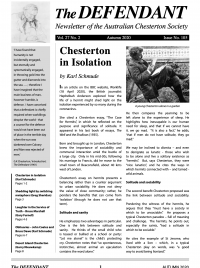
In an article on the BBC website, Worklife (18 April 2020), the British journalist Hephzibah Anderson explored how the life of a hermit might shed light on the isolation experienced by so many during the coronavirus.
She cited a Chesterton essay, “The Case for Hermits”, in which he reflected on the purpose and significance of solitude. It appeared in his last book of essays, The Well and the Shallows (1935).
Born and brought up in London, Chesterton knew the importance of sociability and communal interaction amid the bustle of a large city. Only in his mid-30s, following his marriage to Francis, did he move to the small town of Beaconsfield, about 40 kms west of London.
Chesterton’s essay on hermits presents a balancing rather than a counter argument to urban sociability. He does not deny the value of close community; rather, he ponders the benefits that can come from ‘isolation’ (though he does not use that term).
Solitude and sanity
He emphasizes two advantages in particular. One is the link between solitude and sanity. He thinks of the small child who is teased or bullied at a school or party: “Let me alone!” is the child’s protesting cry. Chesterton notes that “so spontaneous, instinctive, almost animal an ejaculation contains the word alone.”
He then compares the yearning to be left alone to the experience of sleep. He highlights how inescapable is our human need for sleep, and that if we cannot have it, we go mad. “It is also a fact,” he adds, ‘that if men do not have solitude, they go mad.”
We may be inclined to dismiss – and even to denigrate as lunatic – those who wish to be alone and live a solitary existence as “hermits”. But, says Chesterton, they were “nice lunatics”, and he cites the ways in which hermits connected with – and tamed – wild animals.
Solitude and sociability
The second benefit Chesterton proposed was the link between solitude and sociability.
Pondering the witness of the hermits, he argues that they “must have a society in which to be unsociable.” He proposes a typical Chesterton paradox – full of meaning and challenge. The hermits, he points out, especially the saints, “had a solitude in which to be sociable.”
He cites the example of St Jerome, who lived with a lion – which, in a typical Chesterton play on words, was ”a good way to avoid being lionized.”
But Chesterton notes that the conventional sociability of St Jerome’s time in the 4th century, shown in amphitheatres and public festivals, was not a sign of social freedom, but of “social suffocation”. He compares it with the urban experience of our time – whether in the trains and buses of modern urban life, or – as we now experience – the almost overly accessible channels of internet communication, which provide every kind of “virtual” connection.
Remarkably, given that Chesterton was writing in the 1930s, well before the electronic age, he recognized the special value of being a hermit. He compared it with a holiday, which makes us more human than less. He suggested that St Jerome “could get on better with a lion than with the sort of men who would throw him to the lions. . .” and that he “actually liked men better when they left him alone.”
It is in society that men quarrel with their friends; it is in solitude that they forgive them.
G.K. Chesterton
This is the secret of the hermitage – that it offers the mind “a half-holiday”. In Chesterton’s words:
“It is the only way to get any fun even out of the facts of life. . . . It bears most resemblance to the unpacking of luggage. . . . Mere society is a way of turning friends into acquaintances. . . . It is in society that men quarrel with their friends; it is in solitude that they forgive them.”
Solitude, not loneliness
Hephzibah Anderson endorses Chesterton’s comment, arguing that we should “nurture those replenished feelings of goodwill” which solitude affords. She reflects further on its benefits:
Being on your own can in fact be calming and restorative. Even teens, one study has found, are less self-conscious when they’re alone.
Hephzibah Anderson
Time spent with yourself gives you a clearer sense of who you are, and however discontented hermits are with the societies from which they walk, on some deep, peaceable level, they’re quite contented with themselves. As American philosopher Henry David Thoreau confided: ‘I never found the companion that was so companionable as solitude.’
Hephzibah Anderson

On the other hand, the French philosopher Blaise Pascal famously wrote in his Pensées (no. 116) that “all the unhappiness of man arises from one thing only, namely that he is incapable of abiding quietly in one room.” Anderson rejects any simple identification of solitude with loneliness. She notes that the word “hermit” comes from the Greek and means “desert”, which in turn derives from another Greek word meaning “desolate”. And yet, she adds:
“While a certain bleak emptiness can accompany unsought solitude, there is solace to be found even so. . . . Being alone doesn’t mean you need feel lonely, especially not when staying apart is a course of action collectively undertaken.”
The conclusion of Anderson’s reflections is thoughtful – and challenging in a communication-saturated culture:
“If you’ve ever wondered,” she writes, “what echoes of long-forgotten longings and ambitions you might hear within yourself were life only quiet enough, then now is the time to find out – especially if you’re brave enough to switch off your internet connection.”
